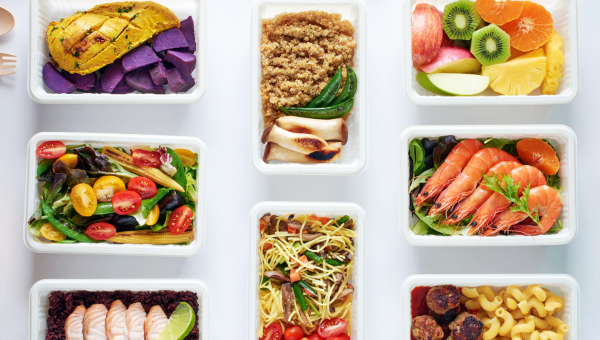Sustainable Weight Management through Meal Planning
Are you tired of fad diets and quick fixes that offer temporary results? Are you looking for a sustainable way to manage your weight and maintain a healthy lifestyle? Look no further. In this article, we delve into the power of meal planning for sustainable weight management, offering you a tried and tested approach that will transform the way you think about food and nourish your body.
Key Takeaways:
- Meal planning is a powerful strategy for achieving sustainable weight management.
- By creating balanced nutrition plans and incorporating healthy meal prep ideas, you can establish a healthy lifestyle.
- Meal planning helps you maintain a consistent and nutritious eating routine, avoiding impulsive food choices.
- Tracking progress and making necessary adjustments to your meal plans are vital for long-term success.
- A supportive environment and mindful eating practices contribute to sustainable weight management.

Understanding Sustainable Weight Management
To effectively manage weight in a sustainable manner, it’s important to understand the principles behind it. Sustainable eating habits and well-designed meal plans play a crucial role in achieving lasting weight management goals.
When it comes to weight management, it’s not just about short-term results. It’s about adopting a lifestyle that supports your overall health and well-being. This is where sustainable eating habits come into play. By making sustainable choices, you can maintain a healthy weight in the long run.
A key aspect of sustainable weight management is incorporating well-designed meal plans into your routine. These meal plans focus on balance, variety, and portion control, allowing you to meet your nutritional needs while still enjoying your favorite foods.
Meal planning allows you to have a clear plan of what you’ll be eating, which reduces the chances of making impulsive food choices. It also helps you stay organized, save time, and minimize food wastage. Additionally, meal plans can be tailored to your specific dietary needs and preferences, making them a flexible tool for sustainable weight management.
Benefits of Understanding Sustainable Weight Management
Understanding sustainable weight management has a multitude of benefits:
- Long-term results: By adopting sustainable eating habits and following well-designed meal plans, you can achieve lasting weight loss and maintain a healthy weight in the long run.
- Improved health: Sustainable weight management can lead to improvements in overall health markers, such as cholesterol levels, blood sugar control, and blood pressure.
- Increased energy: Nourishing your body with nutrient-dense foods through sustainable eating habits can boost your energy levels, helping you stay active and productive throughout the day.
- Better relationship with food: By understanding the principles of sustainable weight management, you can develop a healthier relationship with food, avoiding restrictive diets and finding enjoyment in nourishing meals.
“When you understand the foundation of sustainable weight management, you’re equipped with the knowledge to make informed choices and maintain a healthy lifestyle,” says Johnson.
| Key Principles of Sustainable Weight Management | Significance |
| Balance | Ensures that your body receives the right proportions of macronutrients (carbohydrates, proteins, and fats) and micronutrients (vitamins and minerals) for optimal health. |
| Variety | Provides a wide range of nutrients, promoting overall well-being and preventing dietary deficiencies. |
| Portion control | Helps manage calorie intake, preventing overeating and ensuring a healthy energy balance for weight management. |
| Flexibility | Allows for enjoyment of favorite foods in moderation and adaptation to social situations, promoting a realistic and sustainable approach to eating. |
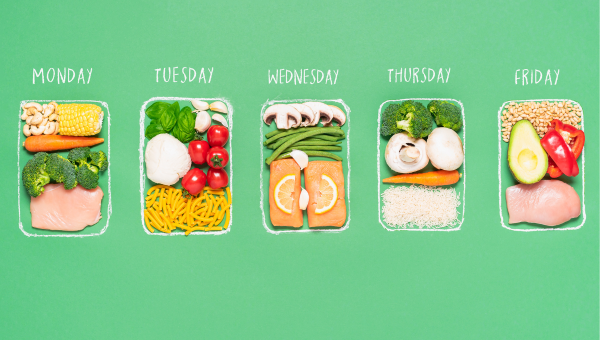
The Benefits of Meal Planning
Meal planning offers a multitude of benefits that can transform your lifestyle and support your journey towards sustainable eating habits. Whether you have a busy schedule or simply want to make healthier choices, incorporating meal planning into your routine can make a significant difference in your overall well-being.
Save Time with Busy Schedules
For individuals with hectic schedules, meal planning is a game-changer. By dedicating a small amount of time each week to plan your meals, you can save precious hours during the week. With a well-thought-out meal plan in place, you won’t have to worry about making impromptu food decisions or scrambling to pack lunches in the morning. Instead, you can enjoy the convenience of having nutritious meals ready to go, allowing you to stay on track with your busy lifestyle.
Promote Sustainable Eating Habits
Meal planning is not just about efficient time management; it is also a powerful tool for promoting sustainable eating habits. By planning your meals in advance, you can ensure that you are making conscious choices that align with your health and wellness goals. With a well-balanced meal plan, you can take control of your nutrition and avoid relying on processed or unhealthy options when hunger strikes. Meal planning empowers you to incorporate a variety of nutrient-dense foods into your diet, helping you maintain long-term sustainable eating habits.
Enhance Nutritional Balance
One of the key benefits of meal planning is the ability to create well-rounded, nutritionally balanced meals. When you plan out your meals in advance, you have the opportunity to include a variety of macronutrients and micronutrients in each dish, ensuring that you are meeting your body’s nutritional needs. This balanced approach to meal planning promotes optimal health, supports weight management goals, and helps prevent nutrient deficiencies.
Reduce Food Waste
Effective meal planning can help reduce food waste by allowing you to utilize ingredients efficiently. By planning your meals in advance, you can make a shopping list based on your planned recipes, ensuring that you only purchase what you need. This minimizes the risk of ingredients going unused and forgotten in the back of your pantry or fridge, reducing food waste and saving you money in the process.
Overall, meal planning offers a range of benefits, from saving time and promoting sustainable eating habits to enhancing nutritional balance and reducing food waste. By incorporating meal planning into your routine, you can take control of your health and well-being, leading to a more balanced and fulfilling lifestyle.
Building a Balanced Nutrition Plan
Creating a balanced nutrition plan is essential for sustainable weight management. By incorporating the right proportions of macronutrients and micronutrients into your meal plans, you can optimize weight loss results while nourishing your body.
Macronutrients: The Foundation of Your Nutrition Plan
Macronutrients, including carbohydrates, proteins, and fats, are the primary sources of energy for your body. Balancing these nutrients is crucial for a well-rounded nutrition plan.
Here’s a breakdown of the macronutrients and their importance:
- Carbohydrates: Provide energy and support overall brain function.
- Proteins: Aid in repairing and building tissues, including muscles.
- Fats: Essential for hormone production and nutrient absorption.
When planning your meals, ensure that each one includes a balance of these macronutrients. Consider incorporating whole grains, lean proteins, and healthy fats in your diet for optimal nutrition.
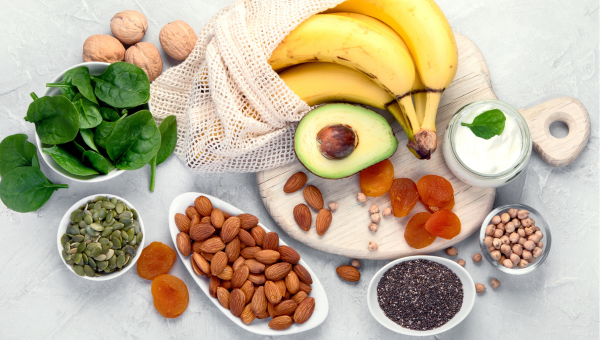
Micronutrients: Essential for Overall Health
In addition to macronutrients, micronutrients play a vital role in maintaining overall health and supporting weight loss efforts. These include vitamins, minerals, and antioxidants.
Here are some essential micronutrients and their benefits:
| Micronutrient | Benefits |
| Vitamin C | Boosts immune system and supports collagen production. |
| Iron | Assists in the production of red blood cells and helps transport oxygen. |
| Calcium | Strengthens bones and teeth. |
| Antioxidants | Protects against free radicals and supports overall cell health. |
Including a wide variety of fruits, vegetables, whole grains, and lean proteins in your meal plans can help you meet your micronutrient needs.
Effective Meal Planning Strategies for Balanced Nutrition
To ensure balanced nutrition in your meal plans, consider the following strategies:
- Diversify your plate: Aim to include a colorful variety of fruits, vegetables, whole grains, lean proteins, and healthy fats in each meal.
- Portion control: Be mindful of portion sizes to avoid overeating and maintain a proper balance of macronutrients.
- Meal prepping: Plan and prepare your meals in advance to ensure you have balanced options readily available and avoid making impulsive, less nutritious choices.
- Listen to your body: Pay attention to your hunger and fullness cues, and adjust your meal sizes and composition accordingly.
By implementing these strategies, you can create meal plans that promote balanced nutrition, support weight loss efforts, and contribute to overall well-being.
Meal Prep Ideas for Sustainable Weight Loss
When trying to achieve sustainable weight loss, having a well-planned meal prep strategy can make all the difference. By preparing your meals in advance, you can ensure a consistent and healthy eating routine, while also saving time and staying on track with your goals. Here are some healthy meal prep ideas that will support your sustainable weight loss journey.
1. Batch Cooking
Batch cooking is a great way to save time and have nutritious meals ready to go throughout the week. Set aside a few hours on the weekend to cook a large batch of lean proteins, such as chicken breast or tofu, along with a variety of vegetables. Portion them into individual containers to enjoy as quick and easy meals during the week. This not only helps you avoid unhealthy takeout options but also ensures that you have healthy, well-balanced meals on hand when hunger strikes.
2. Salad Jars
Salad jars are a convenient and portable option for meal prep. Layer your favorite greens, such as spinach or mixed lettuce, at the bottom of a mason jar. Then, add a variety of colorful vegetables, protein sources like chickpeas or grilled salmon, and a sprinkle of nuts or seeds for added crunch. Top it off with your choice of dressing. When you’re ready to eat, simply shake the jar to mix everything together, and you’ll have a nutritious and delicious salad ready to enjoy.
3. Overnight Oats
For a quick and healthy breakfast option, try preparing overnight oats the night before. Simply combine rolled oats with your choice of milk (dairy or plant-based), a sweetener like honey or maple syrup, and additional mix-ins such as fresh fruits, nuts, or a spoonful of nut butter. Leave it in the refrigerator overnight, and in the morning, you’ll have a creamy and nutritious breakfast ready to grab and go.
4. Freezer-Friendly Meals
Freezer-friendly meals are a lifesaver for busy days when you don’t have time to cook. Prepare large batches of soups, stews, or casseroles and freeze them in individual portions. When you’re short on time or energy, simply heat up one of these homemade meals for a healthy and satisfying option. This also helps reduce food waste, as you can use up any leftover ingredients by incorporating them into these freezer-friendly meals.
5. Snack Packs
Snacks are an essential part of any meal plan, and pre-portioning them can help you make healthier choices throughout the day. Create snack packs by dividing your favorite fruits, raw nuts, or cut-up vegetables into individual containers or resealable bags. Having these pre-portioned snacks readily available will prevent you from reaching for unhealthy options when hunger strikes.
By incorporating these healthy meal prep ideas into your routine, you’ll be setting yourself up for sustainable weight loss success. Remember to customize your meal prep based on your dietary needs and preferences, and don’t be afraid to experiment with different flavors and recipes to keep things interesting. With a little planning and preparation, you can enjoy delicious and nutritious meals while achieving your weight loss goals.

Planning Meals for a Healthy Lifestyle
Meal planning is not just a method for weight management; it is also a powerful tool for adopting and maintaining a healthy lifestyle. By carefully planning your meals, you can ensure that you are nourishing your body with the right nutrients while promoting sustainable eating habits. Here are some meal planning tips for a healthy lifestyle:
1. Prioritize Nutrient-Dense Foods
When planning your meals, focus on incorporating nutrient-dense foods that provide the essential vitamins, minerals, and antioxidants your body needs. Include a variety of fruits, vegetables, whole grains, lean proteins, and healthy fats to create a well-rounded and balanced meal plan.
2. Make Provision for Sustainable Eating Habits
“A healthy lifestyle is not just about what you eat; it’s also about how you eat. Embrace mindful eating practices and savor each bite. Pay attention to your body’s hunger and fullness cues to maintain a healthy relationship with food.”
3. Opt for Batch Cooking
Save time and effort by preparing and cooking larger quantities of food at once. This way, you can have ready-to-eat meals or ingredients available throughout the week. Batch cooking also reduces food waste and helps you stick to your meal plan.
4. Create a Weekly Menu
Plan your meals for the entire week in advance. This allows you to make a grocery list and ensures you have all the necessary ingredients on hand. Having a clear menu also helps you avoid reaching for unhealthy convenience foods on busy days.
5. Include a Variety of Flavors
Keep your meals interesting and satisfying by incorporating a variety of flavors into your menu. Experiment with different herbs, spices, and cooking techniques to add depth and excitement to your meals.
6. Take Advantage of Seasonal Produce
Choose fresh, seasonal produce whenever possible. Seasonal fruits and vegetables are not only tastier but also more affordable. Additionally, by opting for local and seasonal produce, you can support sustainable farming practices.
7. Prepare Healthy Snacks
Prepping nutritious snacks in advance can help you avoid reaching for unhealthy options when hunger strikes. Keep a stash of cut-up fruits, veggies, and homemade energy bars or trail mix in your fridge or pantry for quick and nutritious snacks.
8. Stay Hydrated
Don’t forget to drink enough water throughout the day. Proper hydration is essential for maintaining overall health and well-being. Be mindful of sugary beverages and opt for water, herbal tea, or infused water as refreshing and hydrating alternatives.
9. Be Flexible and Don’t Strive for Perfection
Remember that meal planning should be a tool to support your healthy lifestyle, not a source of stress. Allow yourself to be flexible and make adjustments as needed. Don’t strive for perfection; rather, aim for consistency and progress.
10. Seek Inspiration and Tools
There are numerous resources available to help you plan and prepare healthy meals. Explore recipe websites, cookbooks, and meal planning apps for inspiration and tools that suit your preferences and lifestyle.
By following these meal planning tips for a healthy lifestyle and incorporating sustainable eating habits into your routine, you can enjoy the benefits of nourishing your body, achieving lasting health, and maintaining a balanced lifestyle.
Incorporating Variety and Flexibility
When it comes to sustainable eating habits, variety and flexibility are essential factors to consider. Incorporating a diverse range of foods into your meal plans not only helps to prevent monotony but also ensures you receive a wide array of essential nutrients. Additionally, embracing flexibility in your meal planning allows for adjustments and adaptations as your tastes and dietary needs evolve.
One effective way to incorporate variety into your meal plans is by exploring different cuisines and flavors. Try experimenting with recipes from various cultures, such as Mediterranean, Asian, or Mexican. This not only introduces new tastes and textures but also broadens your culinary horizons. By adding a touch of international cuisine to your meal rotation, you can keep your taste buds excited and engaged.
Another way to add variety is by including a variety of fruits, vegetables, whole grains, lean proteins, and healthy fats in your meals. Each food group offers unique nutritional benefits, so strive to include a mix of colors and textures to ensure you’re getting a wide range of vitamins, minerals, and antioxidants.
| Benefits of Incorporating Variety and Flexibility | Meal Planning Tips |
| 1. Enhanced Nutritional Intake – By incorporating a variety of foods into your meal plans, you can increase your intake of essential vitamins, minerals, and antioxidants. | Explore different cuisines and recipes from around the world.Include a variety of fruits, vegetables, whole grains, lean proteins, and healthy fats.Experiment with different cooking techniques to add variety to your dishes. |
| 2. Prevent Boredom and Monotony – Variety in your meals helps to prevent boredom and keeps you motivated to stick to your healthy eating plan. | Try new fruits and vegetables each week.Rotate your protein sources between poultry, fish, legumes, and tofu.Experiment with different seasonings, herbs, and spices to add flavor to your meals. |
| 3. Long-Term Sustainability – Embracing flexibility in your meal planning allows for adjustments and adaptations, making it easier to sustain your healthy eating habits in the long run. | Allow yourself occasional treats or indulgences to satisfy cravings.Be open to trying new foods and recipes without being too rigid in your meal plan.Listen to your body’s hunger and fullness cues to guide your food choices. |
By incorporating variety and flexibility into your meal plans, you can create a sustainable and enjoyable approach to eating. Not only will you nourish your body with a wide range of nutrients, but you’ll also ensure that your meals remain exciting and satisfying. So embrace culinary exploration, experiment with new ingredients, and let your taste buds take you on a delicious journey towards a healthier lifestyle.
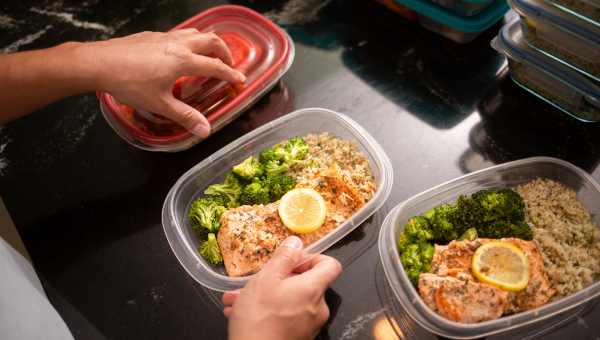
Mindful Eating and Portion Control
To achieve sustainable weight management, it is essential to practice mindful eating and portion control. These practices can help you develop a healthier relationship with food and maintain a balanced nutrition plan. Meal planning plays a critical role in supporting mindful eating and portion control by enabling you to make intentional choices and establish healthy habits.
Mindful eating involves paying full attention to the sensory experience of eating, including the taste, texture, and aroma of food. It encourages you to listen to your body’s hunger and fullness cues, promoting a more intuitive approach to eating. By practicing mindful eating, you can develop a deeper appreciation for the food you consume and become more attuned to your body’s nutritional needs.
“Mindful eating teaches you to nourish both your body and mind, fostering a positive relationship with food.”
Meal planning provides a framework that helps you incorporate mindful eating into your daily routine. By pre-planning your meals, you can make deliberate choices about the types and portions of food you consume. This allows you to create balanced nutrition plans that support weight loss goals while still satisfying your hunger and maintaining optimal energy levels.
Benefits of Mindful Eating and Portion Control
By practicing mindful eating and portion control, you can experience several benefits that contribute to sustainable weight management:
- Enhanced digestion: Mindful eating promotes a slower and more thorough chewing process, improving digestion and nutrient absorption.
- Reduced overeating: Paying attention to portion sizes and eating mindfully can help prevent overeating by increasing awareness of satiety cues.
- Improved satisfaction: By savoring each bite and focusing on the present moment, mindful eating can enhance your enjoyment and satisfaction with meals.
- Emotional connection: Mindful eating encourages you to explore the emotional and psychological aspects of your relationship with food, leading to a healthier connection with nourishment.
- Greater self-awareness: Practicing mindful eating increases your self-awareness around food choices, cravings, and triggers, empowering you to make conscious decisions.
“Practicing mindful eating and portion control can contribute to long-term weight management and improved overall well-being.”
When combined with strategic meal planning, mindful eating and portion control can help you achieve sustainable weight loss and maintain a healthy lifestyle. By incorporating balanced nutrition and intentional choices into your meal plans, you can foster a positive relationship with food and achieve long-term success in reaching your weight management goals.
Strategies for Overcoming Challenges
Overcoming challenges is an integral part of sustainable weight management. Busy schedules, cravings, and emotional eating are common obstacles that can hinder progress. However, with effective meal planning strategies, these challenges can be addressed and overcome.
1. Meal Planning for Busy Schedules
Having a busy schedule should not be a barrier to healthy eating. By incorporating meal planning into your routine, you can save time and ensure that nutritious meals are readily available. Here are a few strategies to help:
- Batch Cooking: Prepare large quantities of ingredients or meals in advance and store them for later use.
- Slow Cooker and Instant Pot Meals: Utilize these convenient appliances to cook meals with minimal effort and time.
- Prep Ingredients in Bulk: Chop vegetables, cook grains, and prepare proteins in advance to simplify meal assembly during busy days.
2. Addressing Cravings
Dealing with cravings can be challenging when trying to maintain a healthy eating plan. However, by incorporating these strategies into your meal planning, you can better manage cravings:
- Include Healthy Snacks: Plan for nutritious snacks in your meal plan to satisfy cravings without derailing your progress.
- Incorporate Flavorful Ingredients: Experiment with herbs, spices, and healthy sauces to add delicious flavors to your meals, reducing the desire for unhealthy options.
- Mindful Indulgence: Allow yourself occasional treats in controlled portions to satisfy cravings while maintaining balance.
3. Dealing with Emotional Eating
Emotional eating can be a challenge to sustainable weight management. Here are some strategies to help address emotional eating through meal planning:
- Identify Emotional Triggers: Recognize the emotions that trigger your tendency to eat and plan alternative activities to cope with those emotions.
- Choose Nourishing Options: Opt for wholesome, nutrient-dense foods that promote feelings of satiety and well-being.
- Practice Mindful Eating: Slow down and savor each bite, paying attention to hunger and fullness cues.
“Meal planning is a powerful tool for overcoming challenges and promoting sustainable weight management. By incorporating strategies that address busy schedules, cravings, and emotional eating, you can stay on track towards your health and wellness goals.” – Dr. Jane Adams, Registered Dietitian
| Challenge | Strategy |
| Busy Schedules | Batch cooking, utilizing slow cookers and Instant Pots, prepping ingredients in bulk |
| Cravings | Including healthy snacks, incorporating flavorful ingredients, practicing mindful indulgence |
| Emotional Eating | Identifying emotional triggers, choosing nourishing options, practicing mindful eating |
Creating a Supportive Environment
When it comes to sustainable eating habits, creating a supportive environment is key. By setting up your kitchen and pantry for success and involving your family or support system in your meal planning journey, you can ensure long-term success in maintaining a healthy lifestyle.

Here are some effective meal planning strategies to help you create a supportive environment:
- Organize your kitchen: Keep your kitchen clean and organized to make meal planning and preparation easier. Utilize storage containers, labels, and shelves to create a system that allows you to locate ingredients quickly.
- Stock up on healthy essentials: Fill your pantry and fridge with nutritious options such as whole grains, lean proteins, fruits, and vegetables. Having these ingredients readily available will make it easier to make healthier choices.
- Involve your family: Make meal planning a family affair by involving your loved ones in the process. Encourage them to contribute ideas, help with meal prep, and participate in grocery shopping. This not only fosters a supportive environment but also promotes a shared commitment to healthier eating habits.
- Display reminders: Place visual cues and motivational quotes in your kitchen to remind yourself of your goals and to stay on track with your meal planning. You can also create a weekly meal schedule or menu board to add structure to your eating routine.
- Don’t be too strict: While meal planning is important, it’s also essential to allow some flexibility. Incorporate occasional treats or family favorites into your meal plans to maintain a balanced approach to eating and to avoid feelings of deprivation.
By implementing these strategies, you can create an environment that supports sustainable eating habits and makes it easier for you to stick to your meal plan. Remember, small changes in your surroundings can have a big impact on your long-term success.
Tracking Progress and Adjusting Meal Plans
When it comes to sustainable weight management, tracking your progress and making necessary adjustments to your meal plans are essential. By understanding how your body responds to different meal choices, you can tailor your approach to achieve optimal results. Here are some effective strategies to help you track your progress and adjust your meal plans:
Evaluating Your Results
Regularly assessing your progress is key to determining the effectiveness of your weight management meal plans. Keep track of your weight, measurements, and body composition to understand how your body is changing over time. You can use a journal, a mobile app, or a spreadsheet to monitor your results consistently.
Making Necessary Tweaks
Based on your evaluation, identify areas where you want to make improvements. This could include adjusting portion sizes, tweaking macronutrient ratios, or incorporating more variety into your meals. Remember that meal plans should be flexible and adaptable to your unique needs. Experiment with different strategies until you find what works best for you.
Staying Motivated
Weight management is a journey that requires commitment and perseverance. Set realistic goals and celebrate your achievements along the way. Surround yourself with a supportive community or find an accountability partner who can help you stay motivated and on track. Remember, progress is not always linear, so be patient and focus on the bigger picture of long-term health and balance.
By tracking your progress and making necessary adjustments to your meal plans, you can ensure that your weight management journey remains effective and sustainable. Embrace the process and keep exploring new strategies to optimize your results.
Conclusion
In conclusion, meal planning is a powerful strategy for achieving sustainable weight management. By incorporating balanced nutrition and healthy meal prep ideas, you can create a lifestyle that promotes long-term success.
Meal planning allows you to take control of your eating habits by carefully choosing nutrient-rich ingredients and planning meals in advance. This not only helps you achieve your weight management goals but also supports sustainable eating habits.
Effective meal planning strategies can help you save time, reduce stress, and make healthier choices. By dedicating a little time each week to plan your meals, you can ensure you have the right ingredients on hand and avoid impulsive food decisions.
So, why wait? Start your meal planning journey today and take the first step towards lasting health and balance. With a well-planned meal schedule, you can enjoy nourishing, flavorful meals that support your weight management goals and contribute to a sustainable lifestyle.
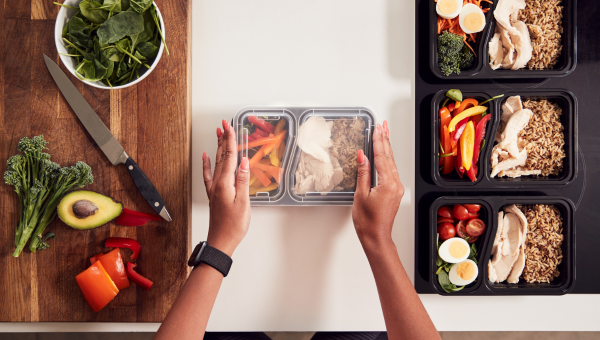
FAQ
What is meal planning for sustainable weight management?
Meal planning for sustainable weight management is a strategic approach to organizing and preparing meals in advance to support long-term weight loss and maintenance goals. It involves creating a well-balanced nutrition plan and incorporating healthy meal prep ideas to ensure consistency and promote sustainable eating habits.
How can meal planning help with weight management?
Meal planning can be highly beneficial for weight management as it allows you to control portion sizes, make healthier food choices, and avoid impulsive or unhealthy eating. It also helps you stay organized, saves time, and reduces stress associated with making decisions about what to eat. By planning and prepping your meals, you can establish a sustainable eating routine and achieve your weight management goals.
What are some meal planning tips for a healthy lifestyle?
To incorporate meal planning into a healthy lifestyle, start by setting realistic goals, such as consuming a variety of fruits, vegetables, lean proteins, and whole grains. Plan your meals in advance, create a grocery list, and batch cook meals to save time during the week. Also, be mindful of portion sizes and listen to your body’s hunger and fullness cues.
How can I create a balanced nutrition plan?
Creating a balanced nutrition plan involves including a variety of food groups in your meals. Aim for a balance between carbohydrates, proteins, and fats, and choose nutrient-dense foods such as fruits, vegetables, whole grains, lean meats, and healthy fats. Portion control is essential, and it’s helpful to consult a Registered Dietitian or nutritionist for personalized guidance.
What are some healthy meal prep ideas for weight loss?
There are numerous healthy meal prep ideas that can support weight loss efforts. For example, you can prepare overnight oats or smoothie packs for quick and nutritious breakfasts. Additionally, you can cook large batches of lean proteins such as chicken or fish and portion them into meals for the week. Pre-cutting vegetables, making salads in jars, and portioning out snacks in advance are also effective strategies.
How can meal planning fit into a busy schedule?
Meal planning is especially valuable for busy schedules. Allocate a specific time each week to plan and prep your meals, and consider batch cooking or utilizing time-saving kitchen appliances such as slow cookers or Instant Pots. Choose recipes that are easy to prepare and store well, and always have healthy snack options on hand. With proper organization and planning, meal prepping can seamlessly fit into a busy lifestyle.
Can meal planning help with overcoming challenges such as cravings or emotional eating?
Yes, meal planning can be a helpful tool for overcoming challenges such as cravings and emotional eating. By creating a meal plan that includes a balance of macronutrients and incorporating satisfying foods, you can reduce cravings and provide your body with the necessary nutrients. Planning meals in advance also helps you make intentional food choices and avoid impulsive or emotionally-driven eating.
How do I track my progress and adjust my meal plans?
Tracking your progress is crucial for sustainable weight management. You can use various tracking methods such as keeping a food journal, using mobile apps, or tracking physical activity. Regularly evaluate your progress, and make adjustments to your meal plans if needed. It’s essential to be flexible and make changes based on your individual needs and goals.
Why is variety and flexibility important in meal planning?
Variety and flexibility are crucial in meal planning to avoid monotony and increase adherence to healthy eating habits. Incorporating a variety of foods ensures you receive a wide range of nutrients, while flexibility allows you to adapt to different situations or preferences. Experiment with different recipes, flavors, and cuisines to keep your meals interesting and enjoyable.
How can I create a supportive environment for meal planning?
Creating a supportive environment is essential for sustaining healthy eating habits. Organize your kitchen and pantry to make healthy foods easily accessible, remove temptations, and surround yourself with nutritious alternatives. Involve your family or support system in your meal planning journey by incorporating their preferences and encouraging their participation.
References:
https://www.healthline.com/nutrition/meal-prep-for-weight-loss
https://www.ncbi.nlm.nih.gov/pmc/articles/PMC5288891
https://radiantpeach.com/meal-preparation-problems/
https://www.mayoclinic.org/healthy-lifestyle/weight-loss/in-depth/weight-loss/art-20047342

